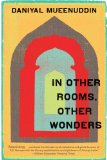Summary | Excerpt | Reading Guide | Reviews | Beyond the Book | Readalikes | Genres & Themes | Author Bio

A complete short story from In Other Rooms, Other Wonders......
Saleema
Saleema was born in the Jhulan clan, blackmailers and bootleggers, Muslim refugees at Partition from the country northwest of Delhi. They were lucky, the new border lay only thirty or forty miles distant, and from thieving expeditions they knew how to travel unobserved along canals and tracks. Skirting the edge of the Cholistan Desert, crossing into Pakistan, on the fourth night they came to a Hindu village abandoned by all but a few old women. They drove them away and occupied the houses, finding pots and pans, buckets, even guard dogs, which grew accustomed to them.
During Saleema’s childhood twenty years later the village was gradually being absorbed into the slums cast off by an adjacent provincial town called Kotla Sardar. Her father became a heroin addict, and died of it, her mother slept around for money and favors, and she herself at fourteen became the plaything of a small landowner’s son. Then a suitor appeared, strutting the village on leave from his job in the city, and plucked her off to Lahore. He looked so slim and city-bright, and soon proved to be not only weak but depraved. These experiences had not cracked her hard skin, but made her sensual, unscrupulous—and romantic.
One morning she lay on the bed of the cramped servants’ quarters in Lahore where she and her husband lived. He was gone for the day, aimless and sloping around the streets, unwanted at the edge of the crowd in a tea stall. Though he knew right away that she slept with Hassan the cook, in this house where she served as a maid, the first time he opened his mouth she made to slap him and pushed him out of the room; and next day as usual he hungrily took the few rupees she gave—to buy twists of rocket pills, his amphetamine addiction.
She picked at the chipped polish on her long slim toe, feeling sorry for herself. Her oval face, taller than broad, with deep-set eyes, had a grace contrasting with her bright easy temperament. At twenty-four this hard life had not yet marked her, and when she smiled her dimples made her seem even younger, just a girl; she still had some of the girl’s gravity. It was true, the cook Hassan had gotten everything from her, as always she’d given it too soon. She had been a maidservant in three houses so far, since her husband lost his job as peon in an office, and in every one she had opened her legs for the cook. She’d been here at Gulfishan, the Lahore mansion of the landlord K. K. Harouni, only a month, and already she’d slept with Hassan. The cooks tempted her, lording it over the kitchen, where she liked to sit, with the smell of broth and green vegetables cooking and sauce. And she had duties in the kitchen, she made the chapattis, so thin and light that they almost floated up to the ceiling. She had that in her hands. Mr. Harouni had called her into the dining room at lunch one day and said he’d never in seventy years eaten better ones, while she blushed and looked at her bare feet. And then, the delicacies that Hassan gave her—the best parts, things that should have gone to the table, foreign things, pistachio ice cream and slices of sweet pies, baked tomatoes stuffed with cheese, potato cutlets. Things that she asked for, village food, curry with marrow bones and carrot halva. The entire household, from the sahib on down, had been eating to suit her appetite.
“Ask for it, my duckling,” said Hassan in the mornings, when she drank her tea sitting beside him, hunched together in the kitchen. “I need to fatten you up, I like them plump.”
“Don’t talk that way, I come from a respectable family.”
“Well, whatever kind of family, what should I stuff that rounded little belly with today?”
Excerpted from In Other Rooms, Other Wonders by Daniyal Mueenuddin. © 2009 by Daniyal Mueenuddin. Excerpted by permission of W.W.Norton & Company. All rights reserved. No part of this excerpt may be reproduced or reprinted without permission in writing from the publisher.
Your guide toexceptional books
BookBrowse seeks out and recommends the best in contemporary fiction and nonfiction—books that not only engage and entertain but also deepen our understanding of ourselves and the world around us.